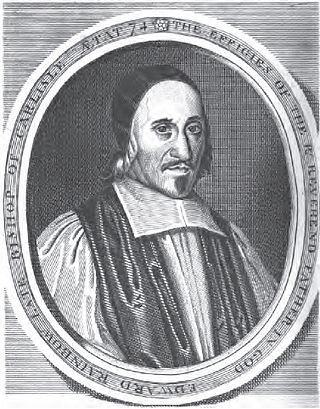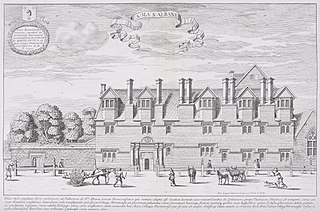Related Research Articles

John Tillotson was the Anglican Archbishop of Canterbury from 1691 to 1694.
William Courtenay was Archbishop of Canterbury (1381–1396), having previously been Bishop of Hereford and Bishop of London.

Sir Leslie Stephen was an English author, critic, historian, biographer, mountaineer, and an early humanist activist. He was also the father of Virginia Woolf and Vanessa Bell.

Frederic Harrison was a British jurist and historian.
Thomas Randolph was an English poet and dramatist, recognised by his mentor Ben Jonson as being a promising writer of comedy, and amongst his contemporaries had a reputation as a wit.

Edward Rainbowe or Rainbow (1608–1684) was an English academic, Church of England clergyman and a noted preacher. He was Master of Magdalene College, Cambridge, Vice-Chancellor of the University of Cambridge and Bishop of Carlisle.
George Davys (1780–1864) was an English cleric, tutor to Queen Victoria, and later Bishop of Peterborough. He was previously Dean of Chester. He himself was educated at Loughborough Grammar School, where a house is named after him.
Alfred Bate Richards (1820–1876) was an English journalist and author. He turned from law to literature and was the author of a number of popular dramas, volumes of poems, and essays. He was the first editor of The Daily Telegraph, and afterwards of the Morning Advertiser. He was one of the leading advocates for the volunteer movement.

St Alban Hall, sometimes known as St Alban's Hall or Stubbins, was one of the medieval halls of the University of Oxford, and one of the longest-surviving. It was established in the 13th century, acquired by neighbouring Merton College in the 16th century but operated separately until the institutions merged in the late 19th century. The site in Merton Street, Oxford, is now occupied by Merton's Edwardian St Alban's Quad.
Henry Cole was an English Roman Catholic churchman and academic.
Robert Crosse (1606–1683) was an English puritan theologian.
Thomas Horton D.D. was an English clergyman, Professor of Divinity at Gresham College in London, and President of Queens' College, Cambridge.
Edmund Staunton (Stanton) (1600–1671) was an English clergyman, chosen by Parliament as President of Corpus Christi College, Oxford, and a member of the Westminster Assembly. Later he was a nonconformist minister.
Thomas White (c.1550–1624) was an English clergyman, founder of Sion College, London, and of White's professorship of moral philosophy at the University of Oxford. Thomas Fuller in Worthies of England acquits him of being a pluralist or usurer; he made a number of other bequests, and was noted in his lifetime for charitable gifts.
Ralph Button was an English academic and clergyman, Gresham Professor of Geometry, canon of Christ Church, Oxford under the Commonwealth, and later a nonconformist schoolmaster.
Thomas Good was an English academic and clergyman, and Master of Balliol College, Oxford. He is known as a moderate in and orthodox apologist for the Church of England, engaging with Richard Baxter and urging him to clarify a 'middle way'.
Henry Clerke was an English academic and physician, President of Magdalen College, Oxford, from 1672.
Sir William Ellis (1609–1680) was an English lawyer, judge and politician who sat in the House of Commons at various times between 1640 and 1679, and supported the Parliamentary cause in the English Civil War.
Richard Crawley was a Welsh writer and academic, best known for his translation of Thucydides's History of the Peloponnesian War.
Dr. William Garnett was a British professor and educational adviser, specialising in physics and mechanics and taking a special interest in electric street lighting.
References
 This article incorporates text from a publication now in the public domain : "Duckworth, Richard". Dictionary of National Biography . London: Smith, Elder & Co. 1885–1900.
This article incorporates text from a publication now in the public domain : "Duckworth, Richard". Dictionary of National Biography . London: Smith, Elder & Co. 1885–1900.